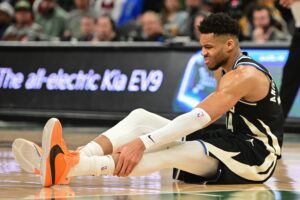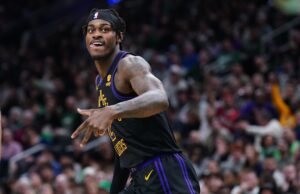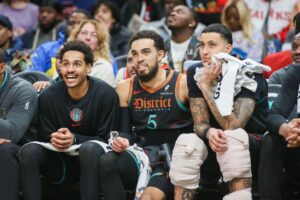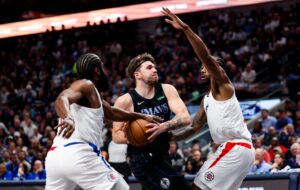Michael Jordan and LeBron James have appeared in an eye-popping 15 NBA Finals combined in their historic careers. Jordan is undefeated with six wins and zero losses in the Finals. James, on the other hand, has a Finals’ record of three wins and six losses.
The first part of The Greatest of All-Time debate detailed each players’ top teammates. Episodes five and six of The Last Dance recently aired and highlighted a few of Jordan’s NBA Finals opponents. Comparing NBA Finals’ competition of James and Jordan is a worthy factor in determining who the greatest of all time is.
Michael Jordan or LeBron James: Ranking NBA Finals’ Opponents
15 – 2012 Oklahoma City Thunder
Record – 47-19
Offensive Rating – 109.8
Defensive Rating – 103.2
Net Rating – 6.6
The 2011-12 Oklahoma City Thunder had the talent to spare. The problem was, they were still too young. They employed a 23-year-old Kevin Durant, 23-year-old Russell Westbrook, 22-year-old James Harden, and 22-year-old Serge Ibaka.
Durant led the team in scoring that season at 28 points per game and in rebounding as he snatched 8 per contest. Westbrook was the team leader in helpers at 5.5 assists per night.
James, alongside Dwyane Wade and Chris Bosh, won their first title together against a team that was perhaps a year or two too early as they took down the Thunder in five games.
14 – 2011 Dallas Mavericks
Record – 57-25
Offensive Rating – 109.7
Defensive Rating – 105
Net Rating – 4.7
The loss in six games to the Dallas Mavericks is perhaps James’ biggest career blemish. Although the world was able to witness one of the greatest performances in NBA Finals history by Dirk Nowitzki, the Heat should haven ever lost to this outmatched, at least on paper, team.
Nowitzki led the team in scoring that season at 24.2 points per game. Tyson Chandler, who was huge, defensively, in the Finals, led them in rebounding with 12.1 per night. 37-year-old Jason Kidd was the leading assist man at 8.9 per game.
13 – 2013 San Antonio Spurs
Record – 58-24
Offensive Rating – 108.3
Defensive Rating – 101.6
Net Rating – 6.7
The 2012-13 San Antonio Spurs came within a few made free throws and a miraculous three on the other end by Ray Allen of winning the 2013 NBA championship in six games. Instead, those missed free throws by a 21-year-old Kawhi Leonard and the made three by Allen allowed the series to get to a Game 7, where the Heat would capture their second consecutive title.
Tony Parker, who was phenomenal in the Finals, led the team in scoring that season at 20.3 points per game. Tim Duncan was the leading rebounder at 9.9 each night. Parker also led the team in assists at 7.6 per game.
12 – 1992 Portland Trail Blazers
Record – 57-25
Offensive Rating – 111.4
Defensive Rating – 104.2
Net Rating – 7.2
The first of Jordan’s six Finals’ opponents checks in at number 12, the 1991-92 Portland Trail Blazers. Jordan noted, in The Last Dance that he and TrailBlazer All-Star Clyde Drexler were being discussed as the top players in the game and that he “took offense to that.”
Jordan went on to note that “he went after Clyde every possession.” Drexler was fantastic during that season in which he led Portland in scoring at 25 points per game and assists at 6.7 each night. Buck Williams led the team in rebounding as he corralled 8.8 rebounds per game.
The Chicago Bulls would go on to win the Larry O’Brien trophy in six games against a very game Portland team.
11 – 1993 Phoenix Suns
Record – 62-20
Offensive Rating – 113.3
Defensive Rating – 106.7
Net Rating – 6.6
The 1992-93 NBA MVP award went to Phoenix Suns forward Charles Barkley. Jordan admitted in The Last Dance that he was upset it by that but said, “fine, you take that, I’m gonna take this (the NBA Title).”
That was the beauty of Jordan, he always found a way to motivate himself to rise above everyone else. It’s not that Barkley wasn’t deserving of the MVP award, he led the Suns in scoring (25.6 per game) and rebounding (12.2 per game). While he didn’t lead the team in assists, he dished out 5.1 helpers per night, which were only behind Kevin Johnson and his 7.8 each game. Barkley also led the Suns to the best record in the NBA that season.
The Bulls closed the Suns out in six games.
10 – 1991 Los Angeles Lakers
Record – 58-24
Offensive Rating – 112.1
Defensive Rating – 105
Net Rating – 7.1
Jordan’s first title came against the Magic Johnson–led Los Angeles Lakers. It had to be gratifying for Jordan to win the NBA championship against Johnson and James Worthy and officially have the torched passed to him. With that being said, the Lakers were not even the best team Jordan and the Bulls beat that postseason. Finally knocking off the Detroit Pistons to reach the NBA Finals was the hurdle they had been stuck trying to get over for a few years.
The Bulls knocked off the Lakers in five games. Los Angeles was led in scoring that season by Worthy at 21.4 points per game. Johnson, as expected, was the leader in assists at 12.5 per game. Vlade Divac helped to hold down the middle as he was the team’s best rebounder as he averaged 8.1 rebounds per game.
9 – 2007 San Antonio Spurs
Record – 58-24
Offensive Rating – 109.2
Defensive Rating – 99.9
Net Rating – 9.3
The 2006-07 Cleveland Cavaliers were not expected to get anywhere near the NBA Finals. The second leader for the Cavaliers that season, behind James, was Larry Hughes at just 14.9 per game. It also took an otherworldly performance against the Eastern Conference favorites to get there.
In what seems to be a perfect storyline, it was the Detroit Pistons who James also had to get past to get to the NBA Finals.
The Spurs that season, however, were fantastic. They had a still in his prime Duncan and Parker and Manu Ginobili who were right in the middle of their primes. As evident by their defensive rating, the 2006-07 Spurs were incredible defensively and they rode that to a four-game sweep of the undermanned Cavs.
Duncan led them in scoring that season at 20 points per night and in rebounding at 10.6 per game. Parker was the leading assist man at 5.5 per game.
8 – 1998 Utah Jazz
Record – 62-20
Offensive Rating – 112.7
Defensive Rating – 105.4
Net Rating – 7.3
The final of Jordan’s six championships came against the 1997-98 Utah Jazz. This Jazz team, while still very good, wasn’t quite as good as the previous iteration. The Bulls dispatched Utah in six games and is the scene of the iconic shot from Jordan on Bryon Russell.
The Jazz rode the great Karl Malone and John Stockton, not only to the 62-20 regular-season record but straight to the finals also. Malone led the team in scoring at 27 points per game and rebounding at 10.3 rebounds per game while Stockton dished out the most helpers at 8.5 each night.
7 – 2014 San Antonio Spurs
Record – 62-20
Offensive Rating – 110.5
Defensive Rating – 102.4
Net Rating – 8.1
The 2014 NBA Finals was the coming-out party, for now, NBA superstar Kawhi Leonard. Leonard was named the 2014 NBA Finals MVP after dominating on the defensive end en route to a four games to one series win in which he defended James the entire way.
Leonard was excellent on the offensive end and was the clear-cut best player in the series. Unfortunately for Heat fans, this would be the last time they would see James don their team’s uniforms as he would head back home, to Cleveland.
The 2013-14 Spurs were the truest definition of “team” that there has been in a long time. Parker led them in scoring at just 16.7 points per game and assists 5.7 per game while Duncan led them in rebounding at 9.7 each night.
6 – 1996 Seattle Supersonics
Record – 64-18
Offensive Rating – 110.3
Defensive Rating – 102.1
Net Rating – 8.2
The 1995-96 Seattle Supersonics were a great team. They just happened to run into the Bulls in the prime of their dynasty and fell in six games in the NBA Finals. Seattle was an excellent defensive team, as evident by their splendid team defensive rating of 102.1. What made them such a well-rounded team, however, was the fact that they were also had one of the best offensive ratings in the NBA at 110.3.
The Supersonics were led in scoring and rebounding that season by the high-flying Shawn Kemp. He averaged 19.6 points and 11.4 rebounds per game. Seattle’s leader and their best player was Gary Payton, however. He was their best defender and led the team in assists at 7.5 per game.
5 – 2015 Golden State Warriors
Record – 67-15
Offensive Rating – 111.6
Defensive Rating – 101.4
Net Rating – 10.2
The dynastical run for the Golden State Warriors started in the 2014-15 season. It, arguably, rivals the Bulls’ run of the 1990s, and again, arguably, isn’t over.
The 2014-15 Warriors knocked off the Cavaliers in six games to win their first of three championships in a four-year stretch. However, they were aided by a little luck with this one. The first of four meetings between the two teams likely goes in a different direction if Kevin Love doesn’t get hurt in the first round of the 2015 playoffs and Kyrie Irving doesn’t go down in overtime of Game 1 of the 2015 Finals. The second best player for the Cavaliers in a series against Stephen Curry, Klay Thompson, and Draymond Green was Matthew Dellavedova and James was able to lead the Cavs to fight for six games.
The Warriors were led in scoring and assists that season by Curry at 23.8 points per game and 7.7 assists per game. Meanwhile, Green led them in rebounding at 8.2 per game.
4 – 2016 Golden State Warriors
Record – 73-9
Offensive Rating – 114.5
Defensive Rating – 103.8
Net Rating – 10.7
The 2015-16 Warriors had the greatest regular season in NBA history as they finished with the best record ever at 73-9. They were well on their way to completing the greatest complete season ever when they held a three games to one advantage over the Cavaliers in the 2016 NBA Finals. What happened next is why James is getting a major boost to his greatest of all-time argument.
Cleveland became the first-ever team to rally from a three games to one deficit in the NBA Finals and they won their franchise’s only championship.
James and Irving led the way in battling back against arguably the greatest team of all time which was led in scoring the first-ever unanimous NBA MVP, Stephen Curry. He averaged 30.1 points per game. They were led in rebounding and assists by Green as he averaged 9.5 rebounds and 7.4 assists per game.
3 – 1997 Utah Jazz
Record – 64-18
Offensive Rating – 113.6
Defensive Rating – 104
Net Rating – 9.6
The 1996-97 Jazz team was the better of the two that matched up with Jordan and the Bulls in the Finals and they would be number one if not for the Warriors.
Even though this is the better of the two Jazz teams, the results were the same. Chicago was able to dispatch the Jazz in six games the first go around just like they did the second time.
Utah was led that season, as per usual, by Malone and Stockon. Malone led them in scoring at 27.4 points per game and rebounding at 9.9 per game. Meanwhile, the NBA’s all-time leader in assists, Stockton, led them with 10.5 per game.
2 – 2018 Golden State Warriors
Record – 58-24
Offensive Rating – 113.6
Defensive Rating – 107.6
Net Rating – 6.0
Don’t let the net rating fool you. This team deserves the number two spot. They battled injuries the entire season and stayed healthy during the playoffs to show what they could do.
Curry missed 31 games. Thompson missed nine games. Durant missed 14 games. Green missed 12 games. Lastly, Andre Iguodala missed 18 games.
All of those injuries and they still nearly eclipsed 60 wins. They went on to sweep the Cavaliers in four games to win their final of their three titles.
Durant and Curry tied for the team lead in scoring at 26.4 points per game. Green led them in rebounding at 7.6 per game and assists at 7.3 per game.
1 – 2017 Golden State Warriors
Record – 67-15
Offensive Rating – 115.6
Defensive Rating – 104
Net Rating – 11.6
After the Warriors dropped Game 7 of the 2016 NBA Finals, they did some recruiting. Durant joined the buzzsaw and the Warriors of 2016-17 could arguably go down as the best team of all time.
James and the Cavaliers didn’t stand a chance despite winning Game 3. The Warriors turned it on again and had too much firepower for Cleveland to overcome.
Curry led them in scoring at 25.3 points per game. Durant was the leading rebounder as he grabbed 8.3 rebounds and Green led them in assists with 7 per night.
Michael Jordan or LeBron James – Better NBA Finals Competition Conclusion
While James had the two weakest teams, by a pretty fair margin, he also had to deal with arguably the greatest dynasty in NBA history in the Warriors. Without that run, Jordan clearly faced better competition in the Finals. However, the four-year battle with Golden State bumps James ahead of Jordan and helps to explain his paltry 3 and 6 NBA Finals record.
Main Photo
Embed from Getty Images






